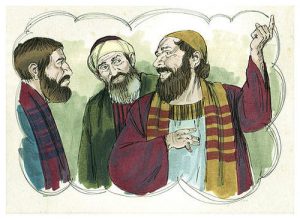In my last post I talked about how I’ve been reading the Book of James, and how James stresses the importance of having an active faith—being “doers of the word, and not hearers only” (James 1:22). I got a lot out of that, because I know all too well how easy it is to keep my Christianity in my head, and out of my daily life.

But James had a lot more to say on how Christians ought to live their lives. Another strong theme in this short letter is the importance of how Christians relate to other people. As I mentioned a few days ago, no one’s really sure to whom James was writing, but he certainly wanted to emphasise to his readers the importance of Christian charity, humility, fair dealing, and moderate speech—simple, every day stuff that I personally feel is as neglected today as it must have been back then.
He certainly had an egalitarian view with respect to wealth and power. In 2:1-4 he says:
My brethren, do not hold the faith of our Lord Jesus Christ, the Lord of glory, with partiality. For if there should come into your assembly a man with gold rings, in fine apparel, and there should also come in a poor man in filthy clothes, and you pay attention to the one wearing the fine clothes and say to him, “You sit here in a good place,” and say to the poor man, “You stand there,” or, “Sit here at my footstool,” have you not shown partiality among yourselves, and become judges with evil thoughts?
He is basically saying that if we are prejudiced against people by their appearance of poverty (and favour people because they appear wealthy), we are judging them, a practice that Christ Himself expressly forbade (see Luke 6:37).
I think it’s important to notice how closely James links being judgemental with the sin of pride. He picks this out strongly in chapter 4, where he quotes Proverbs 3:34—“God resists the proud, But gives grace to the humble”, and urges us to “submit to God” (v6,7). In verses 11 and 12 he goes on to say:
Do not speak evil of one another, brethren. He who speaks evil of a brother and judges his brother, speaks evil of the law and judges the law. But if you judge the law, you are not a doer of the law but a judge. There is one Lawgiver, who is able to save and to destroy. Who are you to judge another?
This is pretty strong stuff! In other words, if we start talking against other people, we’re taking the role of a judge and a lawgiver, a role that belongs to God alone.
Judging others is actually a more insidious and common sin than we realise. We might not know it, though. After all, it’s not as if we’re going around telling people that they’re sinners, and they’re not going to be saved, are we? At least, I hope we’re not.
But James sort of nails it back in chapter 2, where he talks about treating people differently, based on how they’re dressed. What he’s really talking about is prejudice, plain and simple – making assumptions about people when we don’t really know them. That kind of judging is all too easy to do, and James draws the line pretty clearly from there to putting ourselves in God’s position as judge.
Lord, help me to see all people as your children. No matter whether we turn to you or not, we are all your children, and I pray that I’ll be conscious of this in my treatment of others.

